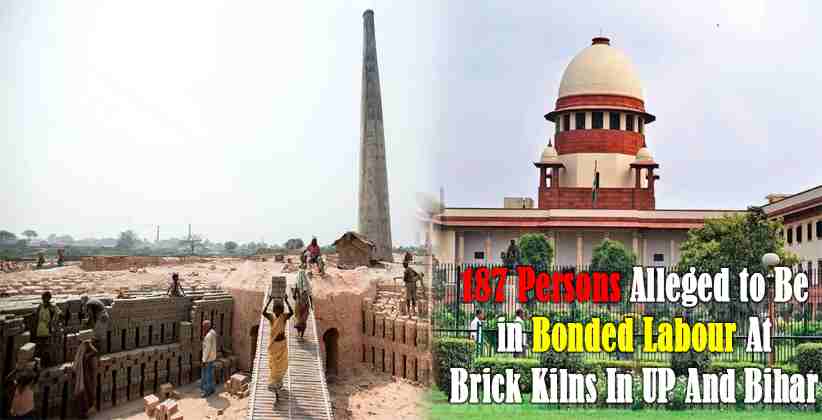The Supreme Court on June 04, 2020, has issued notice to the States of Uttar Pradesh and Bihar on a Public Interest Litigation filed under Article 32 of the Constitution seeking a writ of mandamus or a writ/direction of a similar nature to grant urgent release and rehabilitation to 187 victims of bonded labor (among whom are pregnant women, children, and infants) who are being held at three different brick kilns located in the States of Bihar and Uttar Pradesh.
Direction to this effect was issued by the Bench of Justices L Nageswara Rao, Krishna Murari, and S Ravindra Bhat.
Background of the case:
In April 2019, the Petitioner had received information pertaining to three instances of bonded labor at different brick kilns in the States of Bihar and Uttar Pradesh. After undertaking proper due diligence and collecting intelligence on crime linkages of traffickers/ exploiters their source, transit, and destination areas, the petitioner had with the assistance of a civil society organization filed three written complaints before the National Human Rights Commission (NHRC) on May 08, 2020. On May 11, 2020, the NHRC had taken cognizance of the complaints and passed an order to respective District Magistrates of Sambhal, U.P., and Rohtas, Bihar to depute a team of officers for conducting a spot inquiry in the matter within 15 days. As no actions were taken by respondent authorities, the petitioner was compelled to file a writ petition.
The petitioner has mentioned in his petition that, these victims of bonded labor are being made to do hard physical labor in inhuman conditions, including extreme heat, with only one meal a day. Given that many of the victims are pregnant or minor, immediate rescue and rehabilitation is a matter of life and death, the petitioner submitted.
Regarding the ground for filing the PIL, the petitioner stated that,
This Petition has been filed due to the violation of the fundamental rights of Bonded Labourers under Articles 14, 19, 21, 23 and 24 of the Constitution. The respective State Governments have failed to provide these laborers minimum requirements required to enable a person to live with human dignity by neither rescuing nor rehabilitating such laborers from their traffickers, especially during the COVID-19 pandemic.
The petitioner has claimed that even after the enactment of the Bonded Labour Abolition Act, 1976, (BLA Act) millions of adults and children across India are enslaved by the scourge of Bonded Labour, albeit in forms that continue to morph. The situation had aggravated due to the lockdown of the Covid-19 pandemic as in his words, lockdown has increased every factor of vulnerability that bonded laborers are ordinarily subjected to. Increased isolation, restriction of movement, lack of food supplies, non-payment of wages, and restricted access to government authorities, has severely exacerbated the abusive conditions that bonded laborers are trapped in, claimed petitioner.
The Union Ministry of Labour and Employment revamped the Central Sector (CS) Scheme for the rehabilitation of bonded laborers in 2016 and issued a detailed standard operating procedure (SOP) in 2017, to be followed by all the States and the Union Territories in addressing complaints of bonded labor under the BLA Act. These authorities contemplate that bonded laborers have to be released forthwith and provide for a 24-hour timeline of rescue after the receipt of a complaint. The petitioner alleged that this statutory requirement had been entirely overlooked, and despite the existence of bonded labor having been brought to the attention of the respondent authorities, no action had been taken to date leaving the laborers at the mercy of their traffickers.
To highlight the apathy of respondent State authorities in dealing with the bonded labor complaint, the petitioner relied on the dicta of the Supreme Court in various judgments such as in Bandhua Mukti Morcha v. Union of India & Ors [AIR 1984 SC 802] and in Neeraja Chaudhary vs. State of M.P. [AIR 1984 SC 1099], where the Court has held that the plainest requirement of Article 23 is that bonded laborers must be identified and released, and on release, they must be suitably rehabilitated by the District and State Administration
The Supreme Court has in Bandhua Mukti Morcha held as under:
[Bonded laborers] are non-beings, exiles of civilization, living a life worse than that of animals, for the animals are at least free to roam about as they like.This system, under which one person can be bonded to provide labor for another for years and years until an alleged debt is supposed to be wiped out, which never seems to happen during the lifetime of the bonded victim, is totally incompatible with the new egalitarian socio-economic order which we have promised to build.
The matter is listed for further hearing on June 09, 2020.






